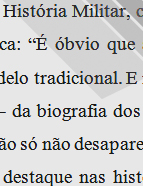

................................
Military h istory developed within the sphere of u niversal h istory, where military events were understood as a broad social projection, encompassing their connections to the progress of institutions and military thought itself. In Portugal, m ilitary h istory followed the trajectory of its European counterparts, and throughout the 19th century and much of the 20th, this field of study was monopolised by military historians. Their work was confined to narrating military successes or failures and the biographies of prominent warlords .
From 1850 onwards, m ilitary h istory became a tool at the service of the state, intended to foster internal cohesion and bolster Portugal’s external affirmation following the turbulent period of the French Invasions and the civil wars. It retained this role, albeit more tenuously, during the Estado Novo regime, particularly in the 1930s and 1940s, as a means of reinforcing the official nationalist spirit. Nevertheless, its strictly military function was decisive, and has remained so even to this day. Naturally embedded within military structures, historians (nearly all career military officers) produced valuable studies from the second half of the 19th century to the early 20th century, following a traditional historiographical framework. This trend persists, reflecting a quasi-panegyrical portrayal of the Army and Portugal.
Among the national military historians dedicated to m ilitary h istory from the early 19th century to the present, particular attention is given to the life and historiographical work of Francisco Pedro Celestino Soares (c. 1791/3–1870). A rear admiral in the Navy, a member of the Council of State, a member of the Cortes , and a fellow of the Royal Academy of Sciences of Lisbon, Soares was deeply interested in the critical study and dissemination of the History of Portuguese Discoveries. His magnum opus, Quadros Navaes ou Collecção dos Folhetins Maritimos do Patriota, seguidos de uma Epopeia Naval Portugueza [Naval Portraits or a Collection of Maritime Essays of the Patriot, followed by a Portuguese Naval Epic] (1845; 1861- 1869), emerges as a highlight among his other works.
This work is financed by national funds through FCT - Foundation for Science and Technology, I.P, in the scope of the projects UIDB/04311/2020 and UIDP/04311/2020.
